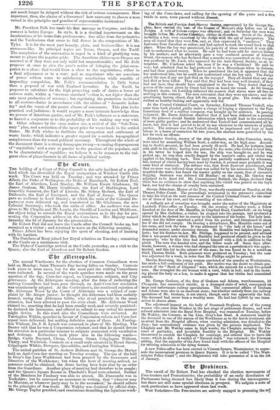Mr. President Polk has made his first message to Congress,
and the do- cument is before Europe. In style, it is a decided improvement an the lucubrations of his immediate predecessors; free alike from the pedantries and the Yankeeisms that came to full flower in the compositions of Mr. Tyler. It is for the most part homely, plain, and business-like: it is not statesman-like. Its principal topics arc Texas, Oregon, and the Tariff. The completion of the annexation is urged in a kind of glorifying tone, meant to please the popular pride. The American claims upon Oregon are asserted as if they were not only valid but unquestionable; and Mr. Polk proposes at once to give the year's notice of bringing the joint-occu- pation to a close: that would force a close to the negotiations, either in a final adjustment or in a war; and as negotiators who are conscious of power seldom come to satisfactory conclusions while sensible of impending compulsion, Mr. Polk's recommendation is little better than a proposal of war with England hereafter. In the Tariff, he proposes to substitute for the high protecting scale of duties a lower ad valorem scale, within a "revenue standard "—that is, not higher than the rate most productive of revenue ; but regulating the protection incidental to all customs-duties in accordance with the claims of " domestic indus- try" and the wants of the poorer classes of consumers. This plan looks practical and judicious: it would require a more intimate knowledge than we possess of American parties, and of Mr. Polk's influence as a statesman, to hazard a conjecture as to the probability of his making any way with it. Other schemes by the same author are, a revival of the " Sub-Trea- sury " plan, and a reduction of the upset price for waste lands in the settled States. Mr. Polk wishes to facilitate the occupation and settlement of waste lands; which indicates a greater regard for a certain topographical completeness than for sound political economy. Throughout the whole of the document there is a strong demagogue twang—a canting disparagement of" capitalists," and a care to pander to the passions of the populace, said to be characteristic of republics: we believe it to be common to the vul- garer class of place-hunters in all forms of political society.




























 Previous page
Previous page